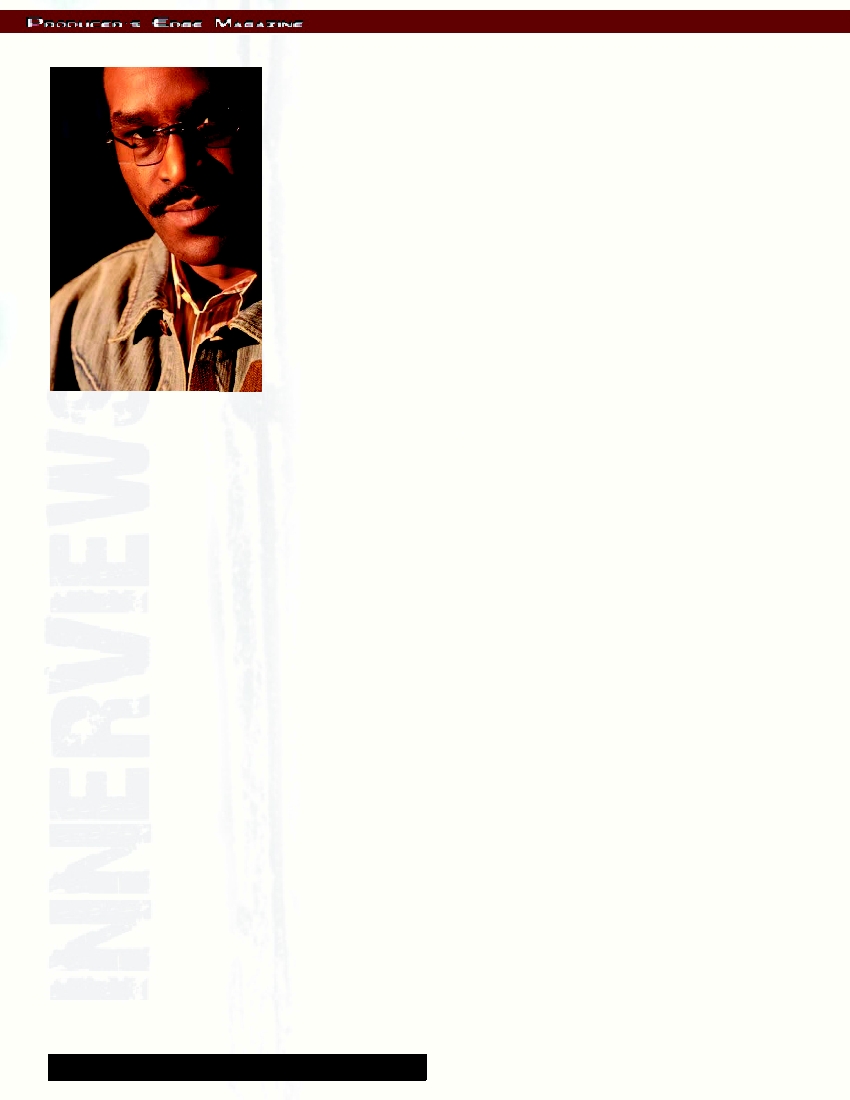56 Producer’s Edge Magazine Fall Winter 08
P
roducer and PE writer Sean
Maru gave us a list of producers
he wanted connected with the SP-
1200 VS article. Easy Moe Bee
was at the top so we got at him.
Simple as that. We begin with the
placement that lands the gear...
instead of the other way around!
Easy Moe Bee: We gained another
victory in “Calling Mr. Welfare”, but
I actually did it on somebody else’s
equipment. And the money that I
earned from that, back then, that wasn’t
a whole of money, but it was the fi rst
money that I ever received. He gave
me $1500 a track, so that is $3000.
And that went straight to buying the
SP.
Straight to the SP. I bought that
fi rst SP1200 when we were recording
with him on the
It’s A Big Daddy Thing
album, we did that at a studio called
Libra Digital. I do not even know if it
still exists in Astoria, Queens.They
were done on a Synclavia.
Going back that far. Was it just
sitting there in the studio or you
actually know it was going to be the
tool.
I bought all my records and all of my
sounds to the studio. I had my little
pad laid out with all of the sounds that I
wanted to sample, whether it was kick
and snare, or loops, little pieces, or
whatever, and we did it that way. As
a matter of fact, I was right there. I
watched them do “Smooth Operator.”
“Smooth Operator” was done on the
Synclavia too. Then I am sitting there
and I am watching the whole process of
keyboard sampling. I already had it in
my mind this is the machine I wanted.
I was just saying to myself “
Wow; this
is the process of keyboard sampling.
What is it going to be like sampling on
the SP1200.”
So how did that process hold up in
the age of the MPC and the ASR-10.
How did that still remain a tool.
I bought the SP1200 a couple of
months into ’89. The SP1200 was still
a really popular machine. I understand
what you are saying with the MPC that
came along and everything, and a lot
of other people gravitated, but I don’t
know, there is something about the
1200 that I was stuck on. Probably still
to this day, it is the sound that I keep
implementing. That sound would be a
comparison between analog and the
fi rst digital.
Was it also in the sequencing, the
timing structure or just the raw
sound you couldn’t get away from.
It was a nice clear sound but just
not as crystally clear as the digital
MP series that they were coming out
with and everything. Like I said, the
difference in the sound is probably
between dropping the needle on an old
45 versus playing a CD. And if I had
a choice of what my sound should be,
I would rather it be the nice, full body
sound of dropping the needle to an old
45. I like my stuff to sound round and
warm like that.
Let’s talk about your record digging
process. What kind of samples are
you attracted to and why is that.
I love guitars. I love keyboards,
sounds- like pad sounds from just
about anything or anywhere. Of
course drums, I am really into the
acoustic drum sound. But I will sample
electronic drum sounds too. But I am
really big
on guitars. I still use a little bit
of horns even though that might not be
really popular but I still deal with them.
And I love any kind of futuristic sounds.
People got the best of that in “Flava in
Your Ear” with Craig Mack.
When you are actually doing your
digging process, do you have the
catalogue in your head of what
bands, what kind of instruments
and what kind of sounds, or are you
a record cover-type digger where if
the cover looks interesting, you are
going to scoop it.
Well, fi rst of all I got a basement.
Just picture my basement. It is full
of records. I have been collecting
records since I was 8 years old, and
some of the things that I loved as a kid
in records are some of the same things
that I love as an adult now. And when
I buy a record, a lot of times, it can be
an artist that I never even heard of. A
lot of times, I buy albums by just the
personnel alone.
Who played drums. Who played
bass.
When I see
Harvey Mason is
playing drums
,
Bob James is playing
keyboards
,
Idris Muhammad is another
alternate drummer
on the album, and
Leo van Doeselaar is playing organ
,
I think I need to have that album, you
know what I mean. I will look just at
the personnel alone.
A lot people buy records for
different reasons. A lot of people are
drawn into an album by the album
cover. That gives me a lot but I have to
read who the producer is and who the
Vintage
Series
Artist Connection
E-MU SP-1200
Producer
Easy Moe Bee

